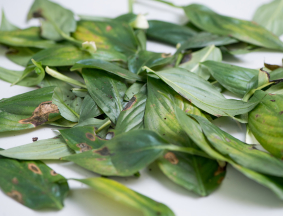There are many factors that can cause crop abnormalities, such as pathogens, fertilization mismanagement or unfavorable climate conditions. Based on visual assessment of the submitted crop material combined with careful evaluation of any information provided, the Plant Doctor identifies the necessary analyses for subsequent diagnosis of the sample.
The Plant Doctors have a wide array of techniques at their disposal, including microscopy, ELISA and plating methods. Highly specific DNA-based methods, such as quantitative PCR, DNA Multiscan and DNA sequencing, are also commonly used for pathogen detection and identification. If needed, Plant Doctors may also use other Eurofins or external labs.
Eurofins Horti provides a range of analyses to diagnose suboptimal crop development or damages caused by pathogens. For this, you can send in different types of materials, such as plants, water samples, substrate and swabs.
Plant Doctor
When your crop has suffered damage, Plant Doctors will initiate a thorough investigation including fungi, bacteria, insects, pests, and viruses. The duration of analysis varies based on the complexity of the issue. Direct communication upon sample receipt and when the results are available is possible. The analysis report will outline the problem description and offer recommendations for preventive measures, along with possible curative steps to be taken.
DNA Multiscan
This test entails a swift routine scan aimed at detecting and identifying a number of potentially harmful fungi and bacteria whose damage may not yet be apparent. Utilizing this DNA-based test, we can analyze water, substrates and crop material. Within three business days, you will receive an analysis report detailing the identified micro- organisms and their respective detection levels.
ELISA
A commonly used method for detecting viruses in plants is the enzyme-linked immunosorbent assay (ELISA). ELISA allows the rapid and accurate identification of specific viruses by detecting viral proteins in plant tissue. Eurofins Horti can detect a wide range of viruses. Not only the most common viruses in tomato, cucumber and sweet pepper, but also other viruses found in ornamentals, vegetables and woody crops.
DisinfectorCheck
To check the performance of your disinfector, bacteria and fungi are counted in water samples collected before and after your disinfection unit. Results will be reported within five to seven business days.
| Name | Date | File |
|---|---|---|
| Example PlantDoctor - Camelia [code 780] | 25-01-2021 | |
| Example PlantDoctor - Dipladenia [code 780] | 25-01-2021 | |
| Brochure PlantDoctor | 13-09-2024 |

